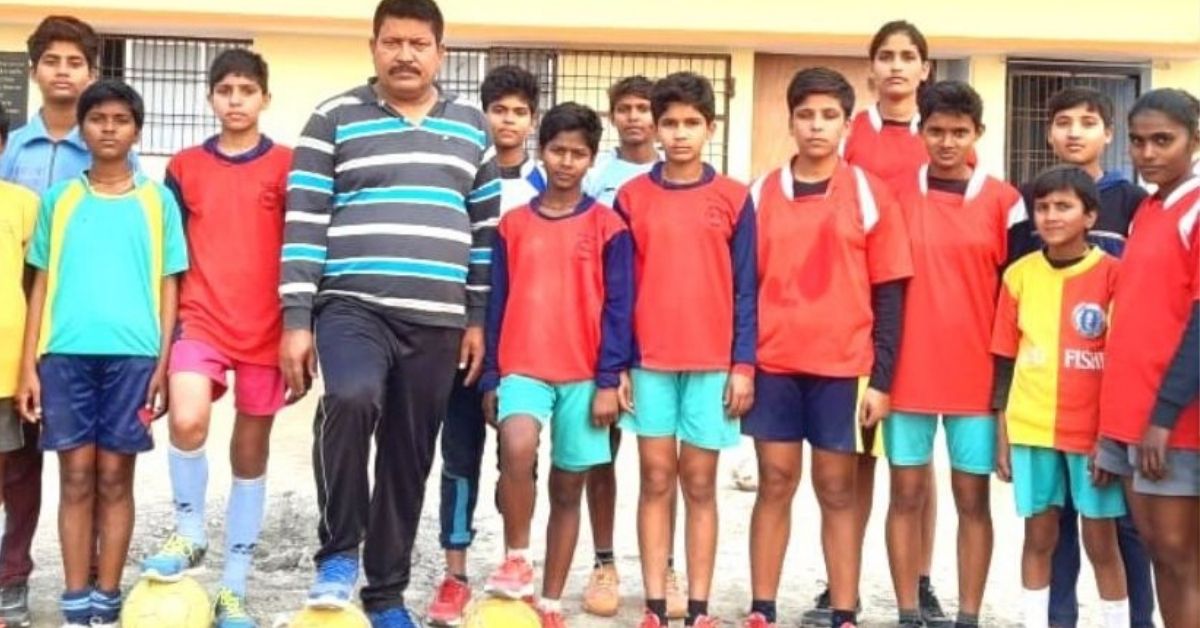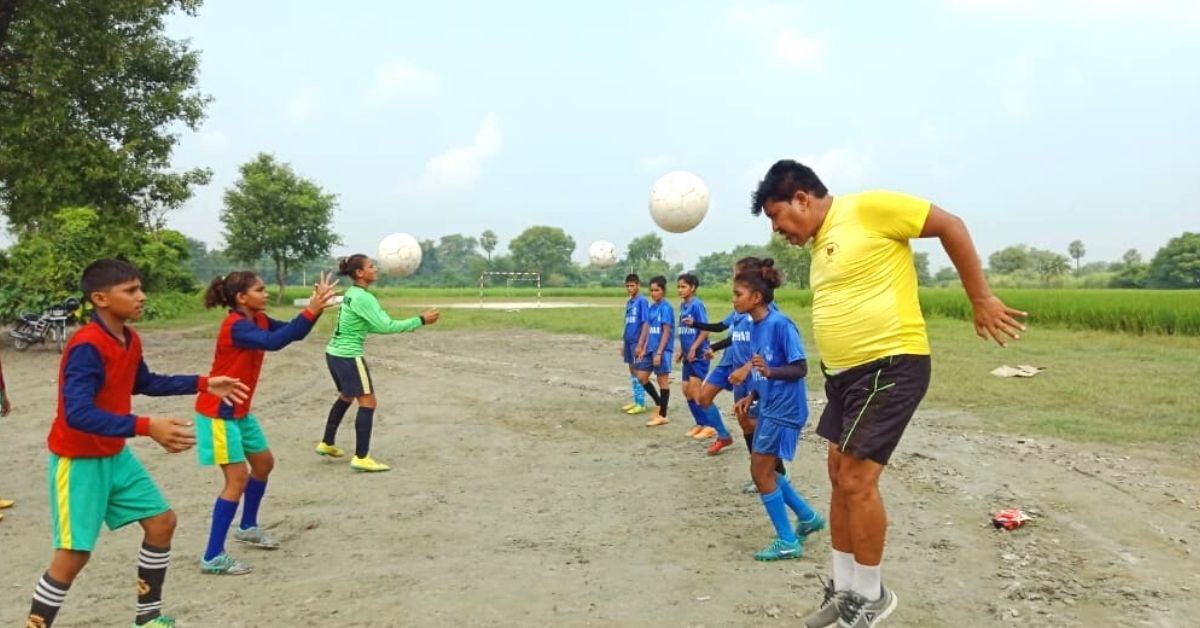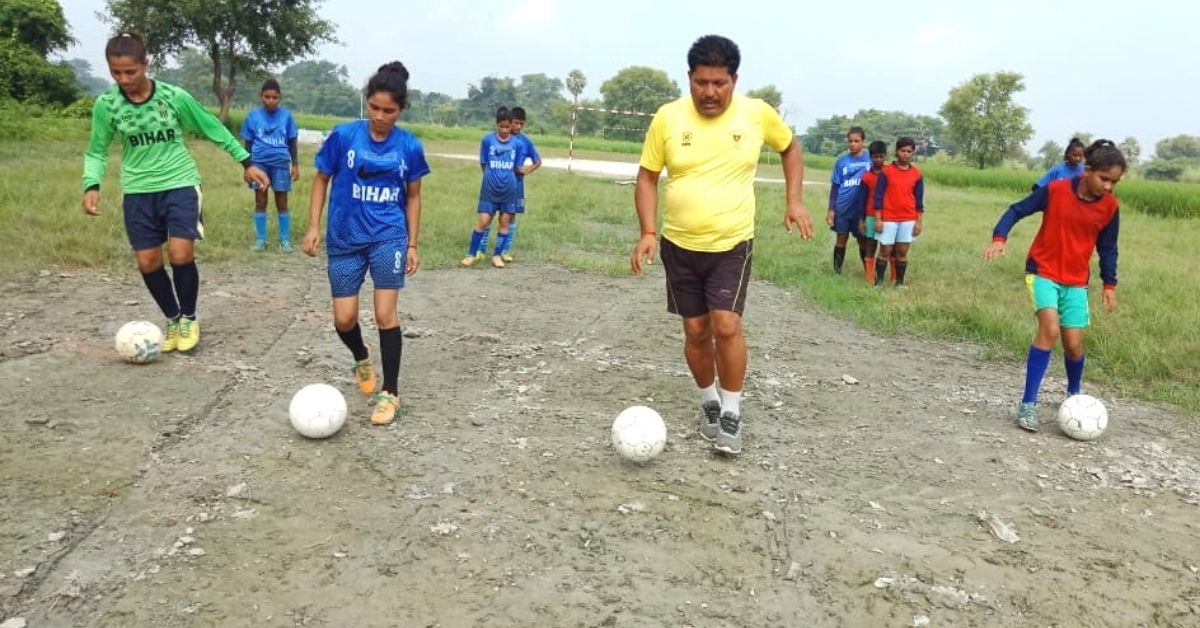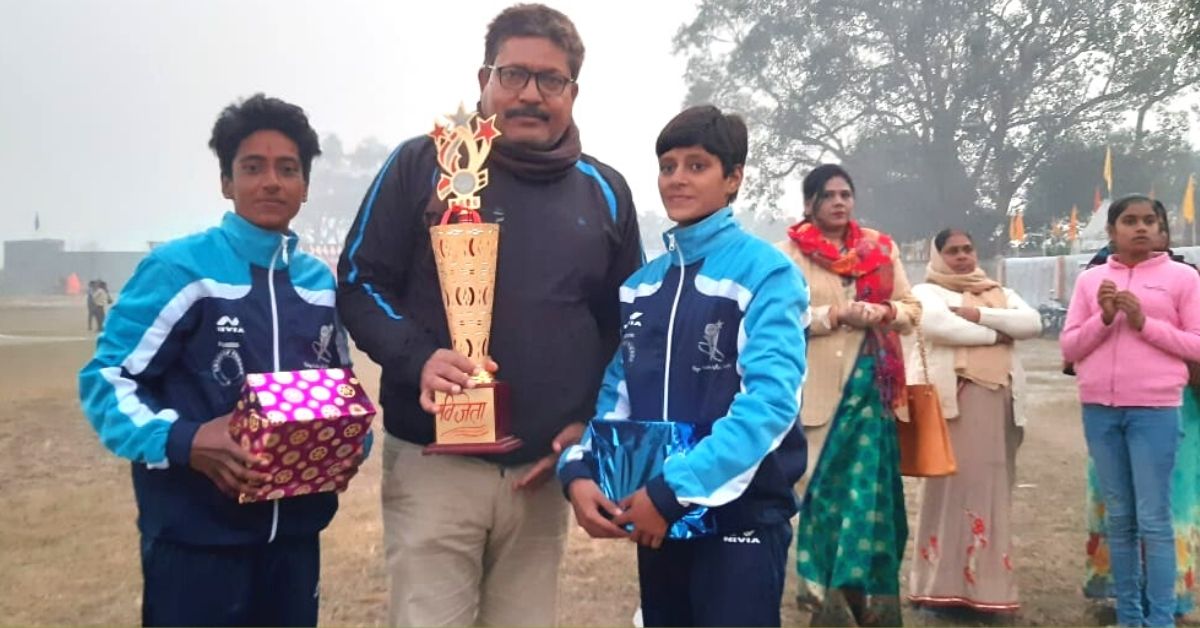This Unsung Govt Teacher Sold His Gold, Spent His Salary to Give India 70 Champions
Sanjay Pathak, a government school teacher from Laxmipur village in Bihar, runs the Rani Laxmibai Sports Academy, where he currently trains around 55 young girls from his village. All free of cost

In many parts of India, families grieve when a daughter is born. She may spend all her life under a veil and with the sole purpose of getting married and then birthing and caring for children.
Fighting this very idea are 55 girls from Laxmipur village of Siwan district in Bihar. Battling insults, resistance, and old stereotypes, these young girls are training in sports at the Rani Laxmibai Sports Academy, under the guidance of their geography teacher and coach, Sanjay Pathak.
Just like the girls he is training, the 47-year-old government school teacher had to fight many battles. He provides training free of cost and his efforts and sacrifices have produced 70 national and international players in football, handball, athletics, and other sports over the past 10 years.
Sanjay is not a formal coach, and is doing this out of pure passion for grooming young talent in his region. His journey to becoming a sports coach began in 2009, after he was posted to Adarsh government middle school in the village.
Village girls go global
Sanjay tells The Better India that in early 2009, two girls, Tara and Putul Khatoon, wanted to participate in the local sports tournament. It took them some time to convince Sanjay, who eventually agreed to register them. To his surprise, the girls won a gold medal in athletics. They also participated in the Panchayat Yuva Khel Abhiyan at the district and state levels, and earned gold, silver and bronze in different categories.

This incident compelled Sanjay to think beyond conventional academic teaching.“I thought if the girls performed so well without any coaching, there must be many such others in the village. I felt it was my duty to enable holistic development of students and extend my role from academic teaching. I started training them before and after school hours,” he says.
Sanjay began training the girls on the school ground. Inspired by Tara and Putul, other girls soon joined. Over the next couple of months, around 100 girls from the village joined him to play football, rugby, handball and for athletics. Sanjay started learning about football from YouTube and other online media. “The girls toiled hard in fields, and had great stamina, endurance, and strength. But they lacked skills, so I began grooming them, even though I was never a sports person myself,” he says.
By 19 November 2009, Sanjay had a girls’ football team ready to compete at district and state levels. The girls went on to play in several competitions and earned recognition.
One of them was Amrita Kumari, who played football in the Under-14 category in France and Sri Lanka in 2013. She later qualified for and headed the Under-16 national team. Nisha Kumari was chosen in the Under-14 national football team in 2015.
Sanjay also focussed on preparing a team in handball and athletics. Usha Kumari was one of the girls, and won a silver in 400 metres in Haridwar in 2015 and 2016. The list goes on, and these players have represented India in Nepal, Tajikistan, Beirut, Lebanon and other national sports competitions.
In January 2019, Sanjay also opened a trust to seek donations. He says with the amount of resistance and opposition they faced from the village, he could never expect any financial support from locals or family members. “I used my salary to sponsor food, travel, and other expenses. Whenever I would spend on, say, buying a pair of shoes for one player, need for another pair, or a football, would arise. I sold my gold rings to fund their coaching. I requested my wife to mortgage her gold, worth Rs 35,000, for construction of the building,” he recalls, adding, “As expenses scaled, family members asked if I was serving the nation, or making my family bankrupt.”
Their trust was restored when Sanjay was finally able to seek financial assistance from outside. People began making tiny donations like giving footballs, shoes, and even Rs 100 or so at times. In recent years, organisations from the UK, Netherlands and the US have donated money.
Despite the incredible achievements of this team, both Sanjay and the girls have had to face severe backlash from their community.
Despite harassment and dehumanisation

“People criticised me for coaching only girls, and questioned my character. Villagers and colleagues asked me why I was making girls wear clothes meant for boys. ‘Why are they wearing short clothes?’ they would ask. They even alleged that I was spoiling the girls and culture of the village by asking them to make a career in sports,” Sanjay says.
The teacher feels that the perception of villagers is wrong. “They saw the girls wearing shorts and t-shirts. They questioned their character. But no one saw the girls training in torn shoes or with a worn-out football. Nobody observed their sweating or the lack of facility they had,” he says, adding that no one came to help them become independent.
Youngsters from the village harassed the girls, eve teased, and even sang vulgar songs. “The school playground where the girls practised was littered with waste and broken glass bottles to demoralise them. However, we would start again by cleaning the ground,” he says.
Fearing the safety of the players, Sanjay convinced his family to dedicate 2 acres of the 5-acre agricultural land to train them. The land was converted into a football ground. A building with a capacity to host 30 girls came up in December 2020. The building has a dormitory, kitchen and other facilities. It was named Rani Laxmibai Sports Academy. “I cannot provide luxurious amenities to the girls, but it is better than having nothing. I spend Rs 130 per plate on each student, but the government recommends a diet worth Rs 225. Their diet includes jaggery, peanuts, eggs, chicken, fish, dal, dalia (porridge), and other nutritional food,” he adds.
Sanjay also says that not every girl makes it big in the field of sports. “If they do not excel, they try to find a government job or study. I teach them and support them in education by paying their fees. Some players, who otherwise would have got married, have received government jobs,” he adds.
A dream beyond marriage

One such example is of Radha Kumari, who lost her father when she was studying in Class VI. “Initially, my family supported me to play as a part of school activities. But as travelling for competitions increased, so did restrictions. I also endured many beatings from my family members to pursue handball. Sanjay sir supported me throughout and convinced them to let me continue sports. I represented the national handball team and I am now a grade B national referee,” she says.
Radha was also recruited in the district administration at Siwan through sports quota.
Amrita Kumari says, “My home is next to the ground where sir conducted football training. I used to watch the girls play every day, and on one occasion, he asked if I would like to join. My mother supported me initially, thinking that I would play until 15 years of age and then get married.”
She says her father and grandmother never supported her, and thought it was not good for their reputation, as playing football involved playing in shorts. “The game did not earn money initially, and spending on a girl is not a practice in the family. It took a lot of convincing from sir and pleading from my end before they let me pursue the game,” she tells The Better India, and adds, “I am 21 years old, and without the game, my family would have married me off five years ago. I have borrowed a few more years to play in the senior category.
Sanjay says that every girl getting training has a struggle story. “Many girls have poor financial conditions, no educational background, and no support from family. During the initial days, they lived in a cramped space with torn bed sheets and blankets. They have fought all odds to achieve success,” he adds.
‘For the cause of nation-building’
The situation has since improved for the academy, as they received support from Dream Sports in November 2020. “Many athletes and players were affected during the COVID-19 pandemic, and we were looking for players who needed help. Sanjay’s work was impressive. Hence, we decided to provide some funds to help the players in training. Plans are under way to bring in international coaches and monthly scholarships for the players,” says Neha Sharma, CSR manager for Dream Sports.
Sanjay says the money received has helped the players immensely. “The girls played with a single pair of shoes for one year. Now they can have three pairs of branded shoes, and the kits that are needed for a national-level player. The money will also help provide better nutrition,” he adds.
What does he gain from all this? “Without education and sports, these girls stare at an uncertain future. As a teacher, I must serve the cause of nation-building. I have been doing this for over a decade, without help from the government. I do not expect these girls to earn and take care of me in my retirement days. I want them to show gratitude by supporting the academy and help other girls earn a dignified and independent life,” he adds.
Edited by Divya Sethu
If you found our stories insightful, informative, or even just enjoyable, we invite you to consider making a voluntary payment to support the work we do at The Better India. Your contribution helps us continue producing quality content that educates, inspires, and drives positive change.
Choose one of the payment options below for your contribution-
By paying for the stories you value, you directly contribute to sustaining our efforts focused on making a difference in the world. Together, let’s ensure that impactful stories continue to be told and shared, enriching lives and communities alike.
Thank you for your support. Here are some frequently asked questions you might find helpful to know why you are contributing?


This story made me
-
97
-
121
-
89
-
167











